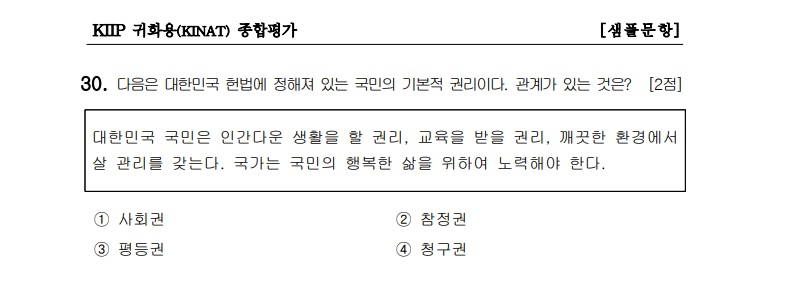After interviewing migrants at the Daejeon Migrant Center (대전이주외국인종합복지관), I learned that the two biggest challenges they faced was language barriers and the Korean citizenship test. Language classes are provided for free at the migrant center, alongside other activities for the children of migrants such as Taekwondo, a small clinic, and legal advice.
Granting citizenships is a complex issue because there is a need to balance both the interests of the government and that of the people. As a citizen, naturalized immigrants can vote and receive social benefits.
While the naturalization requirements are weaker for those married to Korean nationals, the government often exercises caution due to the fear that some marriage-based applicants may divorce right after obtaining it. The difficulty of obtaining Korean citizenship raises questions about what it means to be a South Korean citizen.
Naturalization generally involves taking the Korea Immigration and Naturalization Aptitude Test, which is composed of an interview and multiple choice test. Some of the questions that may appear in a Korean citizenship interview include:
- Explain one important historical site in Korea.
- Which government institution in Korea handles quarantine and infectious diseases?
- When you are sick, which hospital should you go to?
- There are many national holidays in Korea. When is [Name of Holiday] and why do we commemorate it?
- What are some etiquette rules you should follow in everyday life in Korea?

If you are a citizen by birth but have lived your entire life outside the country as I have, some of these questions are likely difficult to answer without some serious studying. This begs the question: does the citizenship test actually reveal who would make a good citizen? After all, if you are born here, there is no need to know all of this information. In fact, one may not be as committed to the country’s values but still be considered a citizen by virtue of being born here.
This does not render the citizenship test completely obsolete however. It exists as an incentive to immigrants to commit to assimilating to the culture and contributing to the economy. However, considering how challenging it is to achieve citizenship in South Korea, it raises the question of whether there are better alternatives to the current system.
Sources
“Korean Naturalization Interview Test with Sample Questions (귀화 면접심사 평가 예시).” Korean Topik, 10 Jan. 2024, www.koreantopik.com/2024/10/korean-naturalization-interview-test.html. Accessed 31 Oct. 2025.
Min-Sik, Yoon. “Naturalization Exam: How Difficult Is It?” The Korea Herald, 22 Dec. 2024, www.koreaherald.com/article/3081469. Accessed 31 Oct. 2025.

